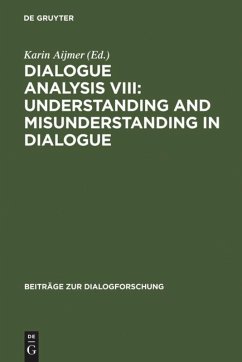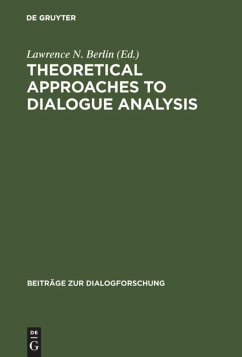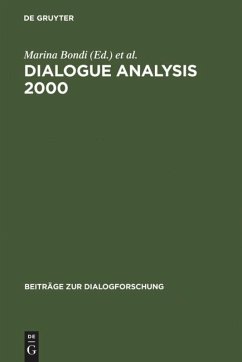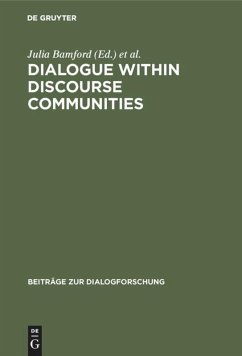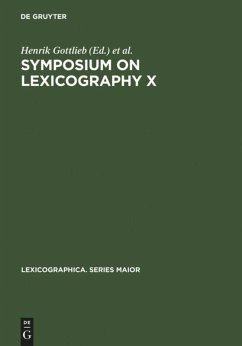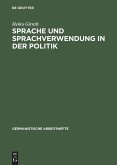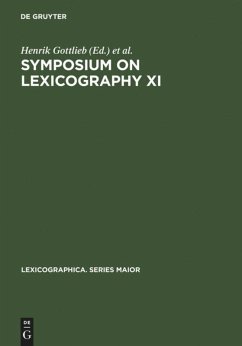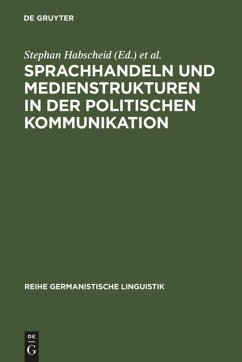Karin Aijmer (Hrsg.)Selected Papers from the 8th IADA Conference, Göteborg 2001
Dialogue Analysis VIII: Understanding and Misunderstanding in Dialogue
Selected Papers from the 8th IADA Conference, Göteborg 2001
Herausgegeben:Aijmer, Karin
Karin Aijmer (Hrsg.)Selected Papers from the 8th IADA Conference, Göteborg 2001
Dialogue Analysis VIII: Understanding and Misunderstanding in Dialogue
Selected Papers from the 8th IADA Conference, Göteborg 2001
Herausgegeben:Aijmer, Karin
- Broschiertes Buch
- Merkliste
- Auf die Merkliste
- Bewerten Bewerten
- Teilen
- Produkt teilen
- Produkterinnerung
- Produkterinnerung
The present collection of articles, presented at the 8th IADA Conference in Göteborg, focuses on understanding and misunderstanding as dialogic phenomena. The notion of a dialogic grammar and dialogic principles as a framework for understanding human communication and cognition is explored in several contributions. Misunderstanding in dialogue is dealt with in institutional and non-institutional settings, in fiction and film dialogue, from several different theoretical perspectives.
Andere Kunden interessierten sich auch für
![Theoretical Approaches to Dialogue Analysis Theoretical Approaches to Dialogue Analysis]() Lawrence N Berlin (ed.)Theoretical Approaches to Dialogue Analysis110,99 €
Lawrence N Berlin (ed.)Theoretical Approaches to Dialogue Analysis110,99 €![Dialogue Analysis 2000 Dialogue Analysis 2000]() Marina Bondi / Sorin Stati (Hgg.)Dialogue Analysis 2000133,99 €
Marina Bondi / Sorin Stati (Hgg.)Dialogue Analysis 2000133,99 €![Dialogue within Discourse Communities Dialogue within Discourse Communities]() Julia Bamford / Marina Bondi (Hgg.)Dialogue within Discourse Communities86,99 €
Julia Bamford / Marina Bondi (Hgg.)Dialogue within Discourse Communities86,99 €![Symposium on Lexicography X Symposium on Lexicography X]() Henrik Gottlieb / Jens Erik Mogensen / Arne Zettersten (Hgg.)Symposium on Lexicography X115,99 €
Henrik Gottlieb / Jens Erik Mogensen / Arne Zettersten (Hgg.)Symposium on Lexicography X115,99 €![Sprache und Sprachverwendung in der Politik Sprache und Sprachverwendung in der Politik]() Heiko GirnthSprache und Sprachverwendung in der Politik19,95 €
Heiko GirnthSprache und Sprachverwendung in der Politik19,95 €![Symposium on Lexicography XI Symposium on Lexicography XI]() Henrik Gottlieb / Jens Erik Mogensen / Arne Zettersten (Hgg.)Symposium on Lexicography XI229,00 €
Henrik Gottlieb / Jens Erik Mogensen / Arne Zettersten (Hgg.)Symposium on Lexicography XI229,00 €![Sprachhandeln und Medienstrukturen in der politischen Kommunikation Sprachhandeln und Medienstrukturen in der politischen Kommunikation]() Stephan Habscheid / Michael Klemm (eds.)Sprachhandeln und Medienstrukturen in der politischen Kommunikation149,95 €
Stephan Habscheid / Michael Klemm (eds.)Sprachhandeln und Medienstrukturen in der politischen Kommunikation149,95 €-
-
-
The present collection of articles, presented at the 8th IADA Conference in Göteborg, focuses on understanding and misunderstanding as dialogic phenomena. The notion of a dialogic grammar and dialogic principles as a framework for understanding human communication and cognition is explored in several contributions. Misunderstanding in dialogue is dealt with in institutional and non-institutional settings, in fiction and film dialogue, from several different theoretical perspectives.
Hinweis: Dieser Artikel kann nur an eine deutsche Lieferadresse ausgeliefert werden.
Hinweis: Dieser Artikel kann nur an eine deutsche Lieferadresse ausgeliefert werden.
Produktdetails
- Produktdetails
- Beiträge zur Dialogforschung 27
- Verlag: Niemeyer, Tübingen
- Reprint 2010
- Seitenzahl: 324
- Erscheinungstermin: 1. Januar 2004
- Englisch
- Abmessung: 236mm x 160mm x 28mm
- Gewicht: 630g
- ISBN-13: 9783484750272
- ISBN-10: 3484750278
- Artikelnr.: 14497753
- Herstellerkennzeichnung Die Herstellerinformationen sind derzeit nicht verfügbar.
- Beiträge zur Dialogforschung 27
- Verlag: Niemeyer, Tübingen
- Reprint 2010
- Seitenzahl: 324
- Erscheinungstermin: 1. Januar 2004
- Englisch
- Abmessung: 236mm x 160mm x 28mm
- Gewicht: 630g
- ISBN-13: 9783484750272
- ISBN-10: 3484750278
- Artikelnr.: 14497753
- Herstellerkennzeichnung Die Herstellerinformationen sind derzeit nicht verfügbar.
Contents: 1. Dialogical Grammar and Spoken Interaction: Per Linell, On Some Principles of a Dialogical Grammar. - Amy B.M. Tsui, What do Linguistic Descriptions have to Say about Discourse? - 2. Misunderstanding as a Dialogical Phenomenon: Sorin Stati, Misunderstanding. A Dialogic Problem. - Anita Fetzer, Infelicitous Communication or Degrees of Misunderstanding? - Ernst W. B. Hess-Lüttich, Understanding Misunderstanding: Kafka's »The Trial«. - Silvia Bruti, Modal Competence and Misunderstandings in »The Merry Wives of Windsor«. - Monika Dannerer, Misunderstandings at Work. - Chiara M. Monzoni, Do Italians >Prefer< Disagreeing? Some Interactional Features of Disputational Talk in Italian Multi-Party Familiy Interaction. - Sara Cigada, The Logical Structure of Dialogue and the Representation of Emotions: An Example from Hitchcock's »Notorious«. - Andreas H. Jucker/Sara W. Smith, He hired who? Problems in Reference Assignments in Conversations. - 3. Signposting in the Dialogue: Simone Müller, The Discourse Marker so in Native and Non-Native Discourse. - Jesús Romero Trillo, Subjective and Objective Grounding in Discourse Markers: A Cross-linguistic Corpus-driven Approach. - 4. Exploring Dialogue in Academic Discourse: Anna Mauranen, Talking Academic: A Corpus Approach to Academic Speech. - Luisa Granato/Anamaría Harvey, Topic Progression in Science Interviews. - Franca Poppi, Pragmatic Implications of the Use of we as a Receiver-including and Receiver-excluding Personal Pronoun. - 5. Dialogue and Multilingual or Multicultural Schools: Robert Maier, Dialogues and Exclusion in Multicultural Schools. - Silvia Gilardoni, Content and Language Integrated Learning: Interactions in Bilingual Classrooms. - 6. Focus Group Discussions: Viveka Adelswärd, Virtual Participants as Communicative Resources in Discussions on Gene Technology. - Victoria Wibeck, Exploring Focus Groups: Analysing Focus Group Data about Genetically Modified Food. - 7. Dialogue Analysis and Corpora: Edda Weigand, Possibilities and Limitations of Corpus Linguistics.
Contents: 1. Dialogical Grammar and Spoken Interaction: Per Linell, On Some Principles of a Dialogical Grammar. - Amy B.M. Tsui, What do Linguistic Descriptions have to Say about Discourse? - 2. Misunderstanding as a Dialogical Phenomenon: Sorin Stati, Misunderstanding. A Dialogic Problem. - Anita Fetzer, Infelicitous Communication or Degrees of Misunderstanding? - Ernst W. B. Hess-Lüttich, Understanding Misunderstanding: Kafka's »The Trial«. - Silvia Bruti, Modal Competence and Misunderstandings in »The Merry Wives of Windsor«. - Monika Dannerer, Misunderstandings at Work. - Chiara M. Monzoni, Do Italians >Prefer< Disagreeing? Some Interactional Features of Disputational Talk in Italian Multi-Party Familiy Interaction. - Sara Cigada, The Logical Structure of Dialogue and the Representation of Emotions: An Example from Hitchcock's »Notorious«. - Andreas H. Jucker/Sara W. Smith, He hired who? Problems in Reference Assignments in Conversations. - 3. Signposting in the Dialogue: Simone Müller, The Discourse Marker so in Native and Non-Native Discourse. - Jesús Romero Trillo, Subjective and Objective Grounding in Discourse Markers: A Cross-linguistic Corpus-driven Approach. - 4. Exploring Dialogue in Academic Discourse: Anna Mauranen, Talking Academic: A Corpus Approach to Academic Speech. - Luisa Granato/Anamaría Harvey, Topic Progression in Science Interviews. - Franca Poppi, Pragmatic Implications of the Use of we as a Receiver-including and Receiver-excluding Personal Pronoun. - 5. Dialogue and Multilingual or Multicultural Schools: Robert Maier, Dialogues and Exclusion in Multicultural Schools. - Silvia Gilardoni, Content and Language Integrated Learning: Interactions in Bilingual Classrooms. - 6. Focus Group Discussions: Viveka Adelswärd, Virtual Participants as Communicative Resources in Discussions on Gene Technology. - Victoria Wibeck, Exploring Focus Groups: Analysing Focus Group Data about Genetically Modified Food. - 7. Dialogue Analysis and Corpora: Edda Weigand, Possibilities and Limitations of Corpus Linguistics.

